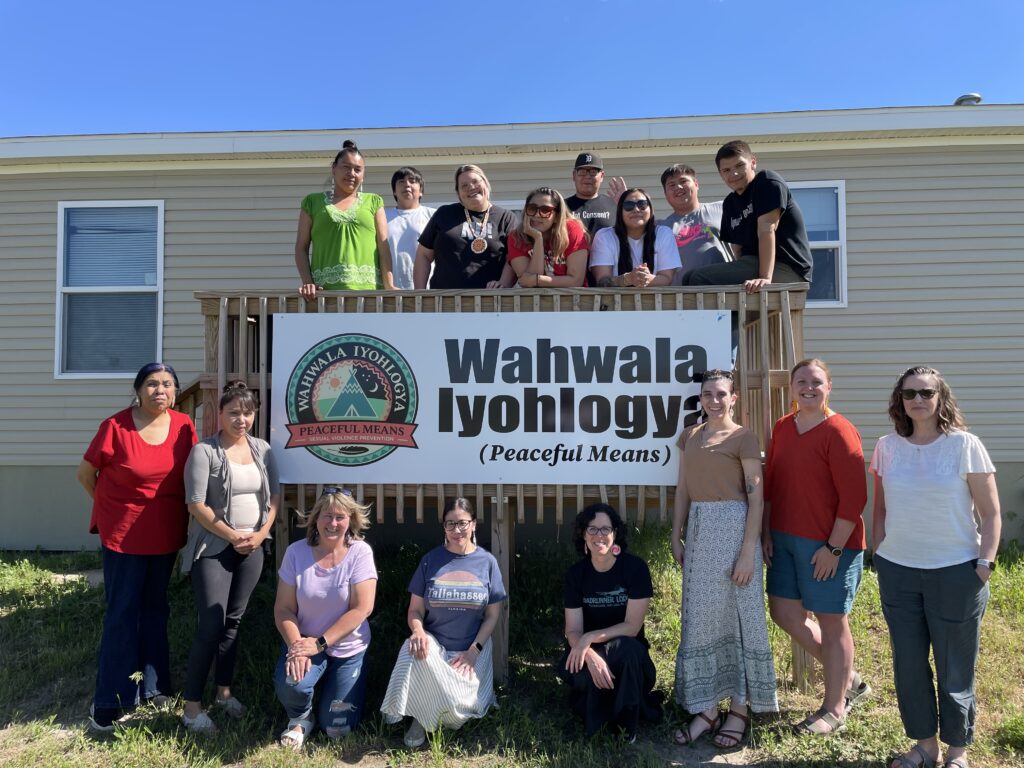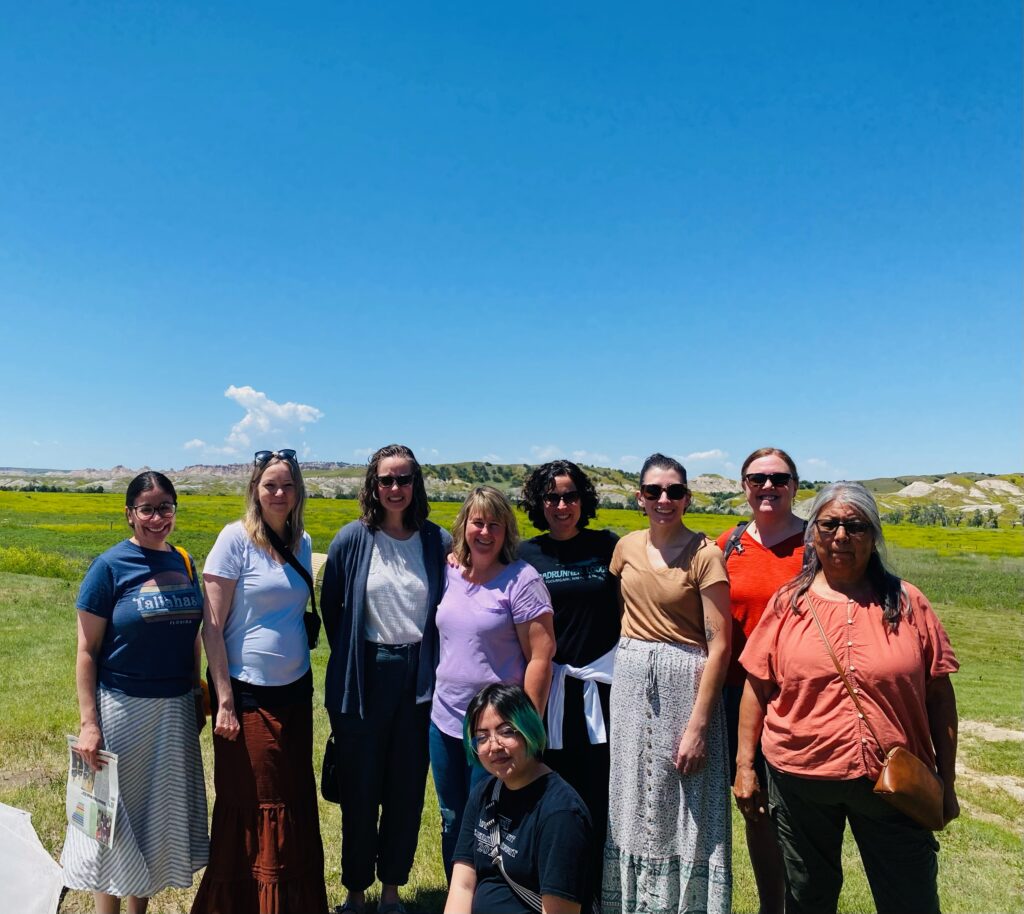Published on July 29, 2024
Inside the spacious trailer office of Peaceful Means, young adults, many enrolled members in the Oglala Sioux Tribe, were busy preparing for their evening meeting of Survivors in Recovery Anonymous (SIRA), a spiritually and culturally adapted program modeled after Alcoholics Anonymous (AA) to help survivors heal from sexual violence. Others were planning their next visit to one of over 25 of schools on or near the reservation to teach kids about sexual violence prevention and empowerment.
The women wore black T-shirts that said “No!” and the men wore ones that asked, “Got consent?” On the walls were a poster of Lakota virtues, a photograph of a small child with the words “Our boss for June,” and a handwritten sign that declared, “I am worth defending!”
A visit to Peaceful Means (Wahwala Iyohlogya), an Indigenous-led sexual violence prevention movement, was one of several stops on a trip to the Pine Ridge Reservation in South Dakota for the leadership team of the UI Injury Prevention Research Center (UI IPRC). Surveys have shown that one in three Native girls and one in ten Native boys across the U.S. and nearly half of Native women have been raped in their lifetimes.
On June 11, the UI IPRC team participated in a full day conference on the reservation addressing violence and injury prevention in Indian Country, as part of a new regional partnership called TIPP (Tri-state Injury Prevention Partnership) Focused on Indigenous Populations with the University of Nebraska (UNL) Interpersonal Violence Research Lab/Peaceful Means Project and the University of Colorado Injury and Violence Prevention Center.

TIPP was formed with a one-year grant from the CDC. Through regular virtual meetings on workforce development, the partners learned from each other about building and sustaining center infrastructure and supporting research, outreach initiatives, and student training. They also discussed programming and service with Indigenous, tribal, and rural communities. The project culminated with the conference, which gave more opportunities to share work and discuss future collaborations.
Mona Herrington, Oglala Lakota Elder and UNL Cultural Outreach Manager said the conference was a great opportunity to meet with people willing to meet indigenous people where they’re at.
“They got to see the poverty and challenges that we face. And they recognized the efforts that these same communities are making to not just survive but to share their stories and the change we are making for children and their families,” she said. “It was such a great experience to hear them too. I hope we will continue to grow together.”
Around 70 people attended the conference (in-person and on Zoom) including researchers, practitioners, educators, students, cultural/spiritual leaders, and community members on and near the reservation. The Colorado team presented work on firearms safety, safe storage of guns, and motor vehicle safety. The UI IPRC team shared research on workplace violence, rural road safety, falls prevention, and disaster preparedness.
The Nebraska team presented on indigenized science and shared promising evaluation results of the Peaceful Means sexual violence prevention program in reservation schools.
Cassandra Saucedo (Oglala Lakota, Student Intern) said the exchange of knowledge and strategies at the conference was invaluable.
“Presenting our preliminary findings at the conference was a profound experience as a student researcher. It allowed me to share crucial preventative information about the Peaceful Means program while also learning from other experts in the field,” she said.
Peaceful Means instructors also demonstrated one of their in-school activities. The conference concluded with a talking circle (an indigenous practice) to share thoughts about the gathering.
Katie Edwards, professor of counseling psychology at UNL and co-leader of Peaceful Means said, “It has been an honor for us at the University of Nebraska to share about our Indigenous-led sexual violence prevention work on Pine Ridge, specifically student engagement to enhance Indigenous representation in violence and injury prevention fields, capacity building for sexual violence prevention within tribal communities, and the importance of community engagement and participatory processes in violence and injury prevention work in Indian country.”

Peaceful Means aims to provide all Indigenous K-12 youth with the opportunity to receive a culturally adapted version of the IMpower program by 2050. This work is currently funded by a UNL–Lincoln Grand Challenges Catalyst Competition grant and Office on Violence against Women grant.
The Nebraska team presented results from the first ever IMpower evaluation with Indigenous (mostly Lakota) girls. The evaluation found that girls who received the program reported 80% fewer instances of sexual assault than girls who did not receive the program at the 6-month follow-up. IMpower has been piloted and studied in both Africa (Kenya, Malwai) and tribal nations that share geography with South Dakota.
Preliminary findings of Peaceful Means among 3rd-5th graders found an increase in knowledge of sexual assault and feelings of empowerment. Among middle school children (6th-8th grade), girls reported an increase in feeling they can defend themselves, and boys reported an increase in valuing sexual consent. 92% of Lakota middle school children said the program made them feel like their life matters.
The Lakota people of this large, rural, and remote reservation (over 2 million acres) experience high unemployment, poverty, and historical trauma from colonization. They have poor health outcomes (e.g., diabetes, alcoholism) and low life expectancies. Most Lakota children don’t graduate from high school. The reservation population is estimated to be at least 40,000.

The day after the conference, Emily Bull Bear gave the Nebraska, Iowa, and Colorado teams a tour of the reservation to learn about the history and culture of the people. They visited a local museum and the site of the 1890 Wounded Knee Massacre. Later that evening, they participated in an Inipi (sweat lodge) followed by a community meal.
Carri Casteel, director of the UI IPRC, said the immersive nature of the visit to Pine Ridge Reservation made a lasting impact on her and the Iowa team.
“Getting to meet with Lakota staff, students, and community members both at the conference and while touring the reservation, helped us better understand the challenges Indigenous peoples face and the sources of strength in their communities,” she said. “We want to continue to learn and look forward to more collaborations.”
Edwards said, “I am confident that this partnership will pave the way for future collaborations that will have a significant and sustained impact on violence and injury prevention among Indigenous peoples in the U.S.”